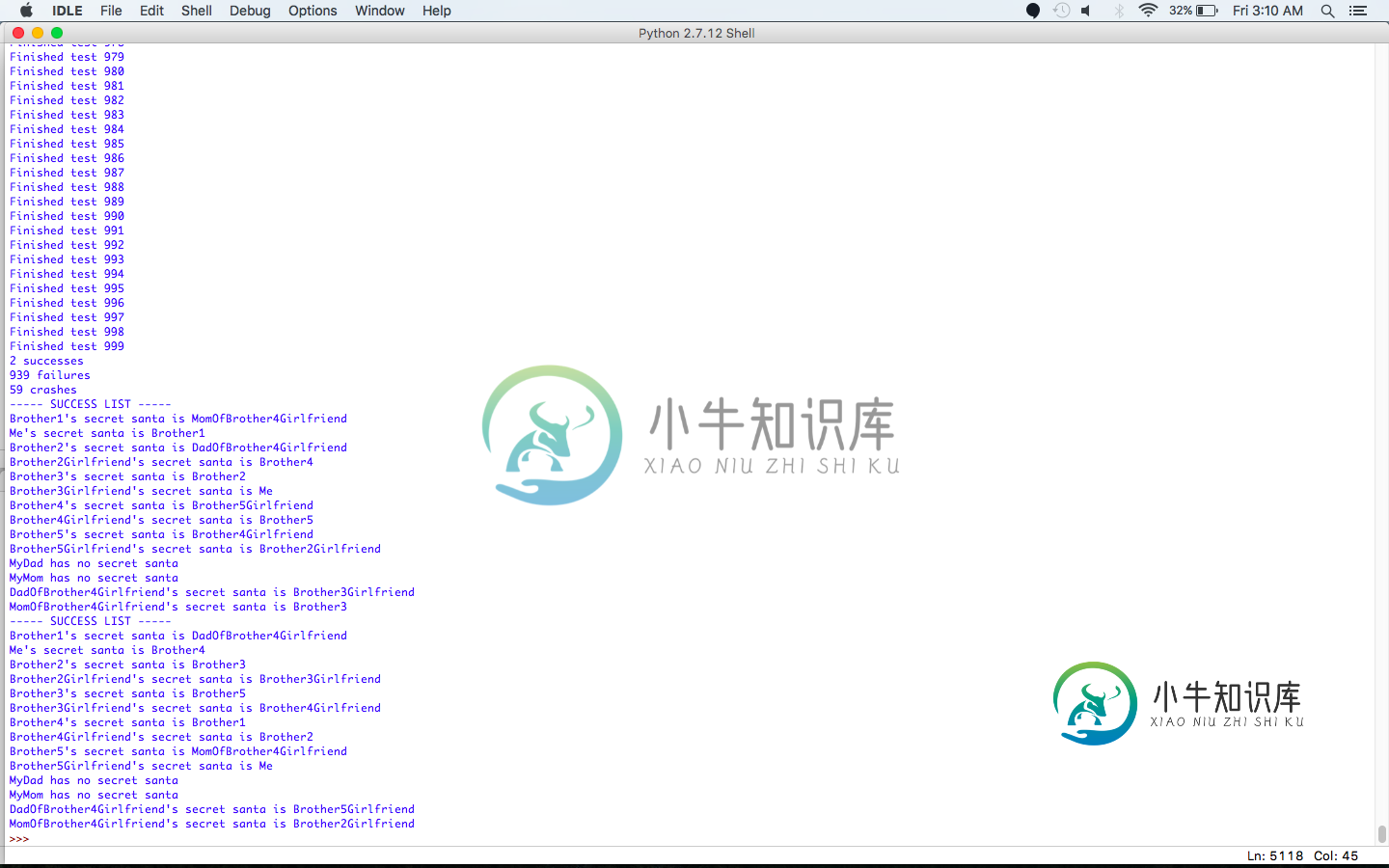Python秘密圣诞老人计划-如何获得更高的成功率
我决定制作一个Python程序,根据硬编码限制(例如,某人不能得到他的妻子)生成秘密圣诞老人配对。我的家人都很忙,所以很难组织每个人随机画帽子。
我的程序崩溃seldomly,因为不幸的随机配对使剩余的不合法(然而,我抓住他们在测试脚本部分)。把它想象成一个重新绘制的人。
然而,当我的程序成功时,我知道配对是正确的,而不必亲自查看它们,因为我的程序测试有效性。明天,我将不得不找到一种方法,使用配对从我的电子邮件账户给每个人发一封电子邮件,告诉他们有谁,而我不知道谁有谁,甚至谁有我。
以下是我完整的程序代码(所有代码都是我自己的;我没有在网上查找任何解决方案,因为我想自己接受最初的挑战):
# Imports
import random
import copy
from random import shuffle
# Define Person Class
class Person:
def __init__(self, name, email):
self.name = name
self.email = email
self.isAllowedToHaveSecretSanta = True
self.isSecretSanta = False
self.secretSanta = None
# ----- CONFIGURATION SCRIPT -----
# Initialize people objects
brother1 = Person("Brother1", "brother1@gmail.com")
me = Person("Me", "me@gmail.com")
brother2 = Person("Brother2", "brother2@gmail.com")
brother2Girlfriend = Person("Brother2Girlfriend", "brother2Girlfriend@gmail.com")
brother3 = Person("Brother3", "brother3@gmail.com")
brother3Girlfriend = Person("Brother3Girlfriend", "brother3Girlfriend@gmail.com")
brother4 = Person("Brother4", "brother4@gmail.com")
brother4Girlfriend = Person("Brother4Girlfriend", "brother4Girlfriend@gmail.com")
brother5 = Person("Brother5", "brother5@yahoo.com")
brother5Girlfriend = Person("Brother5Girlfriend", "brother5Girlfriend@gmail.com")
myDad = Person("MyDad", "myDad@gmail.com")
myDad.isAllowedToHaveSecretSanta = False
myMom = Person("MyMom", "myMom@gmail.com")
myMom.isAllowedToHaveSecretSanta = False
dadOfBrother4Girlfriend = Person("DadOfBrother4Girlfriend", "dadOfBrother4Girlfriend@gmail.com")
momOfBrother4Girlfriend = Person("MomOfBrother4Girlfriend", "momOfBrother4Girlfriend@gmail.com")
# Initialize list of people
personList = [brother1,
me,
brother2,
brother2Girlfriend,
brother3,
brother3Girlfriend,
brother4,
brother4Girlfriend,
brother5,
brother5Girlfriend,
myDad,
myMom,
dadOfBrother4Girlfriend,
momOfBrother4Girlfriend]
# Initialize pairing restrictions mapping
# This is a simple dictionary where the key
# is a person and the value is a list of people who
# can't be that person's secret santa (they might
# be mom, girlfriend, boyfriend, or any reason)
restrictionsMapping = {brother1.name: [],
me.name: [], #anybody can be my secret santa
brother2.name: [brother2Girlfriend.name],
brother2Girlfriend.name: [brother2.name],
brother3.name: [brother3Girlfriend.name],
brother3Girlfriend.name: [brother3.name],
brother4.name: [brother4Girlfriend.name, dadOfBrother4Girlfriend.name, momOfBrother4Girlfriend.name],
brother4Girlfriend.name: [brother4.name, dadOfBrother4Girlfriend.name, momOfBrother4Girlfriend.name],
brother5.name: [brother5Girlfriend.name],
brother5Girlfriend.name: [brother5.name],
dadOfBrother4Girlfriend.name: [momOfBrother4Girlfriend.name, brother4Girlfriend.name, brother4.name],
momOfBrother4Girlfriend.name: [dadOfBrother4Girlfriend.name, brother4Girlfriend.name, brother4.name]}
# Define Secret Santa Class (Necessary for testing script)
class SecretSantaPairingProcess:
# INITIALIZER
def __init__(self, personList, restrictionsMapping):
self.personList = copy.deepcopy(personList)
self.restrictionsMapping = restrictionsMapping
self.isValid = True
# INSTANCE METHODS
# Define a method that generates the list of eligible secret santas for a person
def eligibleSecretSantasForPerson(self, thisPerson):
# instantiate a list to return
secretSantaOptions = []
for thatPerson in self.personList:
isEligible = True
if thatPerson is thisPerson:
isEligible = False
# print("{0} CAN'T receive from {1} (can't receive from self)".format(thisPerson.name, thatPerson.name))
if thatPerson.name in self.restrictionsMapping[thisPerson.name]:
isEligible = False
# print("{0} CAN'T receive from {1} (they're a couple)".format(thisPerson.name, thatPerson.name))
if thatPerson.isSecretSanta is True:
isEligible = False
# print("{0} CAN'T receive from {1} ({1} is alrady a secret santa)".format(thisPerson.name, thatPerson.name))
if isEligible is True:
# print("{0} CAN receive from {1}".format(thisPerson.name, thatPerson.name))
secretSantaOptions.append(thatPerson)
# shuffle the options list we have so far
shuffle(secretSantaOptions)
# return this list as output
return secretSantaOptions
# Generate pairings
def generatePairings(self):
for thisPerson in self.personList:
if thisPerson.isAllowedToHaveSecretSanta is True:
# generate a temporary list of people who are eligible to be this person's secret santa
eligibleSecretSantas = self.eligibleSecretSantasForPerson(thisPerson)
# get a random person from this list
thatPerson = random.choice(eligibleSecretSantas)
# make that person this person's secret santa
thisPerson.secretSanta = thatPerson
thatPerson.isSecretSanta = True
# print for debugging / testing
# print("{0}'s secret santa is {1}.".format(thisPerson.name, thatPerson.name))
# Validate pairings
def validatePairings(self):
for person in self.personList:
if person.isAllowedToHaveSecretSanta is True:
if person.isSecretSanta is False:
# print("ERROR - {0} is not a secret santa!".format(person.name))
self.isValid = False
if person.secretSanta is None:
# print("ERROR - {0} does not have a secret santa!".format(person.name))
self.isValid = False
if person.secretSanta is person:
self.isValid = False
if person.secretSanta.name in self.restrictionsMapping[person.name]:
self.isValid = False
for otherPerson in personList:
if (person is not otherPerson) and (person.secretSanta is otherPerson.secretSanta):
# print("ERROR - {0}'s secret santa is the same as {1}'s secret santa!".format(person.name, otherPerson.name))
self.isValid = False
# ----- EXECUTION SCRIPT -----
### Generate pairings
##
##secretSanta = SecretSantaPairingProcess(personList, restrictionsMapping)
##secretSanta.generatePairings()
##
### Validate results
##
##secretSanta.validatePairings()
##if secretSanta.isValid is True:
## print("This is valid")
##else:
## print("This is not valid")
# ----- TESTING SCRIPT -----
successes = 0
failures = 0
crashes = 0
successfulPersonLists = []
for i in range(1000):
try:
secretSanta = SecretSantaPairingProcess(personList, restrictionsMapping)
secretSanta.generatePairings()
secretSanta.validatePairings()
if secretSanta.isValid is True:
# print("This is valid")
successes += 1
successfulPersonLists.append(secretSanta.personList)
else:
# print("This is not valid")
failures += 1
except:
crashes += 1
print("Finished test {0}".format(i))
print("{0} successes".format(successes))
print("{0} failures".format(failures))
print("{0} crashes".format(crashes))
for successList in successfulPersonLists:
print("----- SUCCESS LIST -----")
for successPerson in successList:
if successPerson.isAllowedToHaveSecretSanta is True:
print("{0}'s secret santa is {1}".format(successPerson.name, successPerson.secretSanta.name))
else:
print("{0} has no secret santa".format(successPerson.name))
请原谅我的一些冗余代码,但我已经离开Python一段时间了,没有太多时间重新学习和研究概念。
起初,我的程序测试是这样进行的:大部分是成功的测试,0次失败(非法配对),很少崩溃(出于我上面提到的原因)。然而,那是在我的家人决定为今年的秘密圣诞老人增加新规定之前。我的妈妈可以是某人的秘密圣诞老人,爸爸也可以,但没有人可以是他们的秘密圣诞老人(因为每个人每年都给他们送礼物)。我哥哥的妻子的父母也包括在内,我哥哥、他的妻子和他妻子的父母之间不可能有任何配对。
当我加入这些新的限制规则时,我的测试大多失败,很少成功(因为随机性通常导致2到1个人在执行结束时没有秘密圣诞老人)。见下文:

秘密圣诞老人过程中设置的限制越多,解决的问题就越复杂。我渴望提高这个项目的成功率。有办法吗?在考虑秘密圣诞老人的限制时,我需要考虑哪些规则(排列或数学上常见的)?
共有1个答案
这是一个二部匹配问题。您有两组节点:一组用于给予者,另一组用于接收者。每个集合中的每个人都有一个节点。如果一对是有效的,那么从给予者到接受者都有一个优势。否则就没有优势。然后应用二部匹配算法。
-
我们被要求创建一个程序,可以用于游戏"秘密圣诞老人": 这是我开发的程序。到目前为止,如果我输入3个人(例如Bob、Ben、Bill),它将返回“Ben为Bill购买”,而没有人为Ben或Bob购买。我目前正试图让它输出“Bob为Ben买东西,Ben为Bill买东西,Bill为Bob买东西”,但到目前为止还没有成功。如果有人能给我一个提示/设置这个的基础,我将不胜感激。另外,如果我的代码中有任何错
-
我想用js制作一个小脚本,有一个用户列表,一个用户必须向另一个用户赠送礼物。 通过应用以下约束: > 如果“a”是圣诞老人,给“c”送礼物,那就不能反过来了。所以“c”不可能是“a”的圣诞老人。 它必须同时处理偶数和奇数用户。 在你看来,什么是正确的方法来尽量减少比较的数量,也就是说,加快脚本的速度。 我本来想这样开始,但后来我不知道该怎么做:
-
我正在做一个程序,它将模拟秘密圣诞老人的分类帽。我试图让程序有一个错误陷阱,以防止人们获得自己的名字,但我无法让程序在有人获得自己的名字时选择一个新的名字。我遇到的另一个问题是,程序一直过早退出。 这是我的代码:
-
我想做一个秘密圣诞老人节目。理想情况下,程序应该要求至少三个名字,然后程序会询问是否有更多的名字。如果是,打开另一个文本字段并将其添加到名称列表中。如果没有,打破循环,创建一个单独的列表,其中包含名称,打乱第二个名称列表,并将它们与原始列表中的名称配对。 例如,如果John、Elliot、Sarah和Jenny输入了他们的名字,程序将他们的名字打乱,它应该输出这样的内容: 但我得到的是: 代码如下
-
我正在运行fabric 1.4.0网络,我是它的管理员。我丢失了其中一个身份(不是管理员)的密码/机密。 我怎样才能知道这个秘密 我知道,每当我们注册一个新身份时,我们就会得到这个秘密(如果尚未提供的话),并且可以将这个秘密用于注册和其他目的。但我失去了这个秘密。 我也知道,我可以通过使用命令来向身份发布一个新的秘密。但是,这不是我的选择。我想得到现有的一个。 我运行了来查看身份信息,但没有在那里
-
1)能不能帮我用蝴蝶结扎一下辫子呀?我想成为你的圣诞节礼物诶✨ 2)我是铃儿你是叮当~因为铃儿想叮当✨ 3)在等雪花圣诞树新年烟火和更好的我们✨ 4)世界上哪有圣诞老人,礼物都是来自爱你的人✨ 5)希望到圣诞节那天你能和我说Merry Christmas还有Merry me✨

